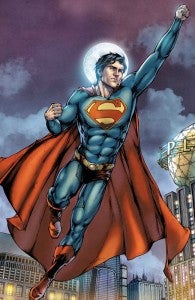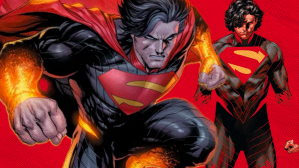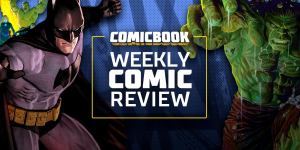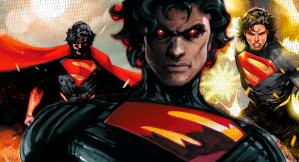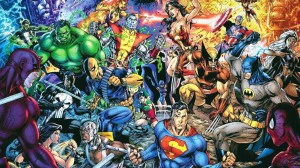With his seventy-fifth anniversary coming up in 2013 and a movie on the way, Superman as a comic book property is…well, let’s be charitable and say it’s not as strong as it could be.Oh, hell, it is what it is: Superman’s a mess.There’s certainly some enthusiasm over the notion of a Scott Snyder-Jim Lee ongoing featuring the character, but along the road to that comic eventually coming out (it’s not yet been solicited), Grant Morrison will be writing his final issue of Action Comics and stepping away from superheroes for a while. Scott Lobdell, currently writing the monthly Superman book, is a controversial choice, to say the least.He’s also the third writer (well, fourth, but two of them were a team) to take on the title in its first fifteen issues. Both George Perez and the Dan Jurgens/Keith Giffen tag team lasted an arc apiece, which is the kind of thing that works really well for the bookstore market but frankly doesn’t resonate with the readers of serialized, monthly comics who tend to want some degree of consistency.Perez, in particular, is an interesting case because he has admitted that writing the book was simply not what he wanted it to be. Editorial interference, coupled with quite a bit of input from the people at Warner Brothers who are making the movie and, on some level, making the rules was the order of the day.That seems to jive with what we’ve just seen in Justice League #13 with the character–there’s been a lot of speculation that the movie studio were responsible for contriving the Superman/Wonder Woman romance, and we’ve been told outright by DC that the relationship is going to dramatically impact the world around them. A month after it began, though, the couple have decided to take it slow.”Unfortunately when you are writing major characters, you sometimes have to make a lot of compromises and I was made certain promises,” Perez said at a public speaking engagement, which was recorded. “Unfortunately not through any fault of Dan DiDio, he was no longer the last word, lot of people making decisions, going against each other, contradicting, again in mid-story. The people who love my Superman arc, I thank you. What you read, I don’t know. After I wrote it, I told them ‘Here’s my script, if you change it, that’s your prerogative, don’t tell me. Don’t ask me to edit it, don’t ask me to correct it, I don’t want to change something that you’re going to change again if you disagree.’”Jurgens was somewhat more charitable, telling us that “everyone had the best of intentions, but the goals simply didn’t line up.”Rumor has it that the whole New 52 has been operating like that, and that Superman is a bit less of a special case than one would think. Still, it seems to be indicative of a larger philosophy, albeit a bit exaggerated in this specific case. That, the constantly-rotating creative team on the core book and the presence of a best-selling original graphic novel series featuring the character, all coalesce to send a very clear message: DC would benefit from focusing less on the never-ending drumbeat of serialized storytelling and focusing more on self-contained stories, shorter arcs that eventually find resolution for most of their plot points, and original graphic novels.Superman: Earth One Volume 2 hits the stores this week, the second in a best-selling series of graphic novels written by J. Michael Straczynski along with artist Shane Davis. It’s getting strong reviews so far, in no small part because frankly JMS hadn’t been laboring under those same kinds of editorial interferences (at least as far as anyone knows). It allowed him to churn out a coherent and entertaining narrative–a good book for a good book’s sake.If you’re going to can the writer every six or twelve issues, there’s really no good reason not to pursue that model. Both the Perez run and the Jurgens/Giffen run had enormous potential. While neither of them cleared the bar they set for themselves, those creators all have stellar resumes. There’s no reason to suppose that they wouldn’t have churned out top shelf work if they weren’t laboring under incredibly complex circumstances. There’s editorial interference, there’s film studio interference…and, of course, there’s the fact that Grant Morrison’s Action Comics, set five years in the past, was allowed to have its run of the place.Perez had to wait until characters and concepts had been introduced in Action Comics before they would be greenlit on Superman. Morrison, meanwhile, was playing the long game. His priority has never particularly seemed to be to play nicely with other creators, but to craft work that’s as good as it can be. For that, he’s received rave reviews and tends to outsell most other writers in the business. The Action Comics hardcovers, like the Superman: Earth One hardcovers, are beautiful volumes of well-made comics, where character and story come first and the corporate agenda appears to exist in service of those objectives. One assumes, especially since Jim Lee is the co-publisher of DC, that his book with Snyder will be the same way.If the company can’t give that same slack leash to Lobdell, though, then one has to wonder: Do we really need three monthly Superman books, if one of them is going to be a mess?
Why Superman Underscores the Need for More Original Graphic Novels
With his seventy-fifth anniversary coming up in 2013 and a movie on the way, Superman as a comic […]


